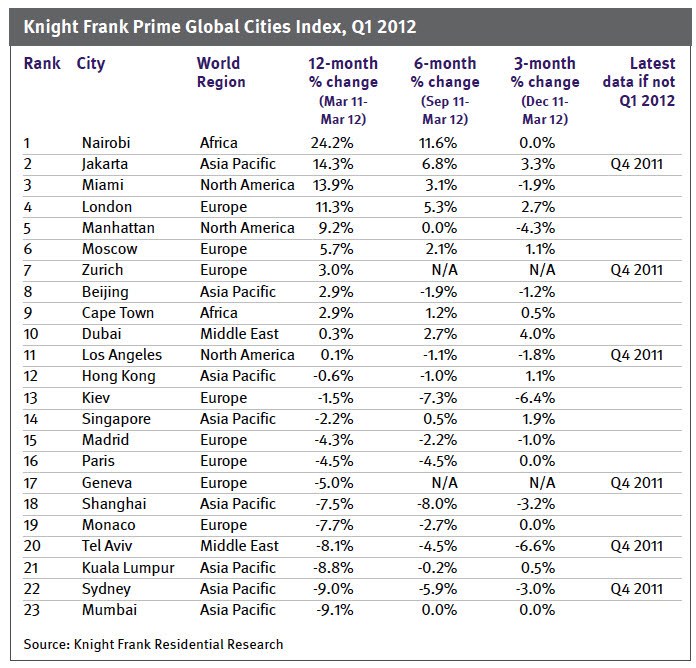Global property market downturn is gathering pace
Thursday, May 31st, 2012(Please note that Canada is not one of the countries analyzed by the Global Property Guide).
The world’s housing markets moved clearly down during the year to the first quarter of 2012, according to the Global Property Guide’s latest house price indices survey.
Residential property prices fell in 24 countries, of the 36 countries for which quarterly house price statistics are available, and rose in only 12 countries.
During the latest quarter the downturn appears to have accelerated, with property price falls in 26 countries and price gains in only 10.
In nominal terms only 16 countries experienced home price falls during the year, while 20 countries recorded price rises. But the Global Property Guide’s statistical presentation uses price changes after inflation, giving a more realistic picture than the more upbeat nominal figures usually preferred by estate agents.
Faster-paced deterioration in European housing markets
Ireland’s price-declines have been, over the duration of the crisis, catastrophic. It is disheartening to see more agony, yet the picture really is alarming. House prices fell 18.95% year-on-year, contrasting with a decline of ‘only’ 13.12% during the same period last year. Furthermore, house prices were down 5.19% during the latest quarter. Tough credit conditions, an oversupply of housing, and weak domestic demand have weighed down the Irish residential property market.
There was also an alarming increase in momentum of house-price declines in Athens, Greece (-11.68%); in Warsaw, Poland (-10.94%); in Portugal (-10.45%); in Spain (-9%); in the Netherlands (-6.05%); and in the Slovak Republic (-5.89%). All saw bigger house-price declines this year than the previous year.
Several countries whose housing markets were last year either in recovery or only just in downturn, saw a significant deterioration in their position, with house price falls during the year to end Q1 2012 in Finland (-2.05%), in Turkey (-2.32%), Sweden (-5.34%) and Riga, Latvia (-5.83%).
In other European countries, any positive changes in the momentum of the housing markets were so feeble, that they hardly signal a recovery. These countries include Kiev, Ukraine (-2.51%), Croatia (-2.45%), United Kingdom (-3.14%), Lithuania (-3.87%) and Bulgaria (-6.21%).
Some strong European markets do relieve the gloom. In Estonia house prices surged by 9.13% year-on-year, and in Austria house prices rose by 8.24% year-on-year. In fact the upsurge in these two countries’ housing markets was so strong as to propel them into third and fourth place in the worldwide league table.
Other strong housing markets over the past twelve months include Switzerland (+5.49%), Norway (+5.43%), Russia (+3.86%) and Iceland (+2.25%). The ‘gainers’ seem to be countries whose housing markets either never experienced the recent downturn (Austria, Switzerland, Norway), or are recovering (Estonia, Russia, Iceland).
House prices in India (Delhi) and Brazil (Sao Paulo) surged further, but momentum was down during the quarter. Over the year to Q1 2012, Delhi house prices skyrocketed by 24.41%, though during the last quarter, they fell 0.07%. Some other Indian cities like Chennai and Kolkata saw house price falls year-on-year, according to NHB Residex.
In Sao Paulo, house prices climbed by 18.70% in the year to Q1 2012, but the latest quarter saw a price-decline of 2.57%.
Most Asian housing markets slowing
In the Philippines (Makati Central Business District), prime condominium prices rose by 7.34% during the year. But the figures possibly exaggerate the upsurge, because they are for Makati, the heart of the Philippines’ business process outsourcing boom. In South Korea house prices were up 2.67% from a year earlier.
Housing markets in the rest of Asia cooled over the year to Q1 2012, due to government measures implemented last year. House prices in Hong Kong were up a mere 0.19% on the year, after a rise of 19.80% the previous year. There were house price falls in Indonesia (-0.13%), Singapore (-1.36%), Tokyo, Japan (-2.64%) and Shanghai, China (-3.68%).
US housing market making progress
US house prices rose modestly to 0.48% year-on-year, with a quarterly rise of 0.55%, according to the Federal Housing Finance Agency’s (FHFA) seasonally adjusted purchase-only house price index. In inflation-adjusted terms, US house prices were still down 2.27% from a year earlier. But this is a significant improvement from last year’s 7.44% decline in house prices.
Increased affordability and a somewhat smaller inventory of homes for sale are positively impacting house prices, says FHFA Principal Economist Andrew Leventis.
Israeli house prices weakening
House prices in Israel were down 4.94% year-on-year to Q1 2012. Prices were hit by worldwide uncertainty, plus measures taken by the Israeli government and the Bank of Israel. The fall comes amid popular protests since last summer over high prices, which have not yet waned.
New Zealand firm, but Australia under pressure
House prices in New Zealand climbed by 0.82% over the year to Q1 2012, after falling 4.79% the previous year. Sales activity has been strong for the last few months, with volumes at the highest levels since 2007.
Australian house prices fell for the fifth straight quarter to -6.04% from a year earlier, the longest downturn for a decade. The central bank has maintained the highest borrowing costs among major developed nations.
Source: Global Property Guide




